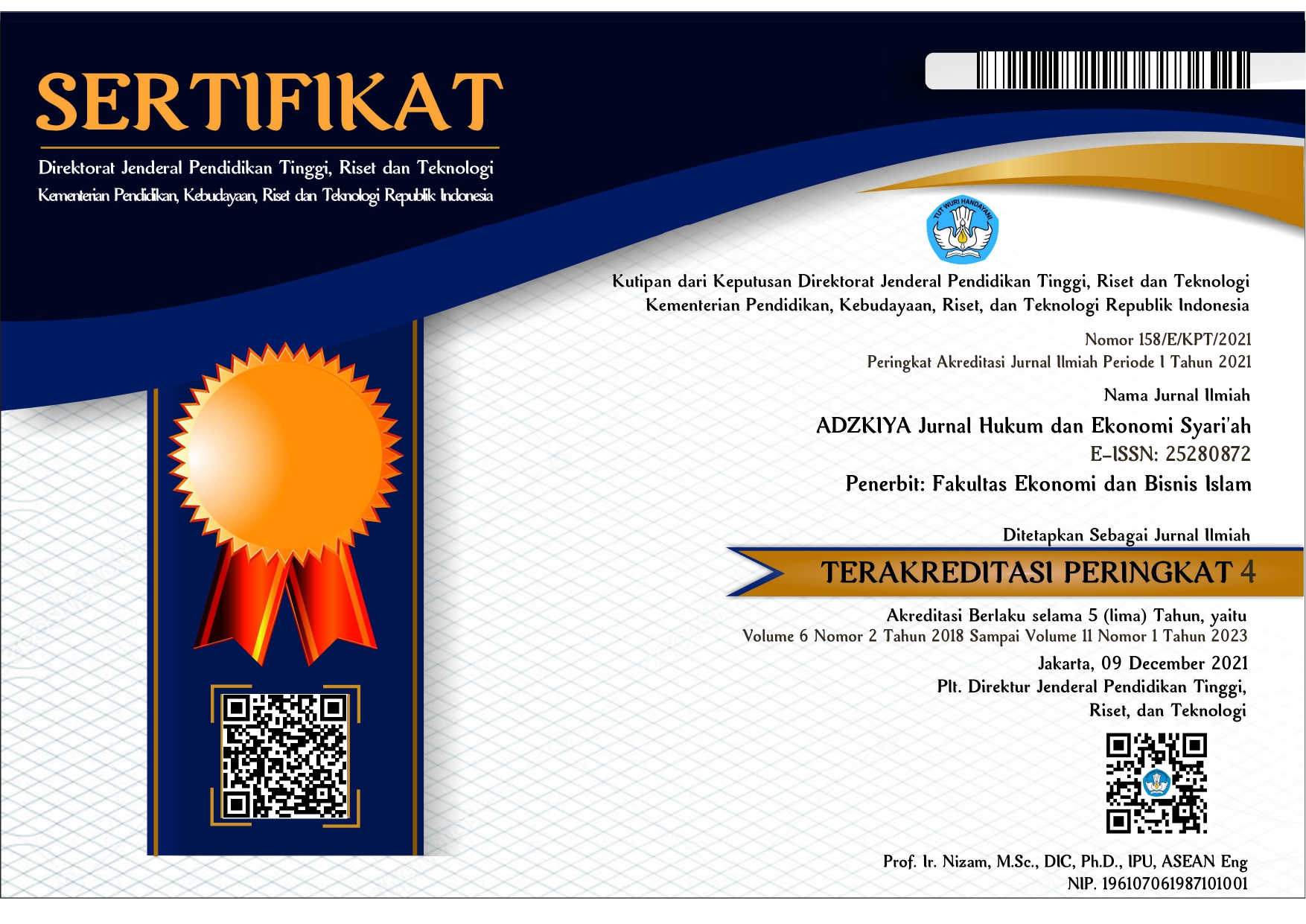Analisis Kinerja Perusahaan Peraih Penghargaan Proper Emas Terhadap Green House Gas Emission Disclosure: Indonesia Case 2013-2020
DOI:
https://doi.org/10.32332/adzkiya.v9i01.2577Kata Kunci:
Keywords: disclosure, greenhouse gas emissions, company performance, properAbstrak
ABSTRAK
Penelitian ini dilakukan untuk menguji kinerja perusahaan berdasarkan metriks uang dan rasio terhadap pengungkapan emisi gas rumah kaca. Pengujian dilakukan terhadap 31 perusahaan yang mendapat peringkat Proper emas tahun 2013-2018 dengan analisis regresi linier berganda. Hasil penelitian menunjukkan secara simultan kinerja perusahaan berdasarkan metriks uang dan rasio berpengaruh positif terhadap pengungkapan emisi gas rumah kaca dengan probabilitas 0,0031. Namun, setelah diuji secara parsial hanya satu variabel yang berpengaruh secara signifikan tetapi pengaruhnya adalah negatif, variabel tersebut adalah sales. Sementara lima variabel lainnya yaitu Ebitda, Profit, Asset, Price, dan Roe tidak menunjukkan pengaruh yang signifikan. Oleh karena itu, perlunya sebuah edukasi mengenai pengungkapan emisi gas rumah kaca yang berbeda dengan pengungkapan tanggung jawab social perusahaan.
Kata Kunci:pengungkapan, gas emisi rumah kaca, kinerja perusahaan, proper
Referensi
Ambec, S, Cohen, M, A,, Elgie, S,, & Lanoie, P. (2013). The Porter hypothesis at 20: Can environmental regulation enhance innovation and competitiveness. Review of Environmental Economics and Policy.
Asmaranti, Y, L. (2014). Comparation of Greenhouse Gas Emission Disclosure Before and After Enactment of the Indonesia Act No, 17 of 2004. Issues in Social and Environmental Accounting, 225–234.
Cho, C, H, & Patten, D, M. (2007). The role of environmental disclosures as tools of legitimacy: A research note. Accounting, Organizations and Society, 32(7–8), 639–647.
Choi, B, B, D, Lee, and J, P. (2013). An Analysis of Australian Company Carbon Emission Disclosure. Journal Pacific Accounting Review, 25(1), 58–79.
Collins, A, & Harris, R, I, D. (2002). Does plant ownership affect the level of pollution abatement expenditure? Land Economics, 78(2), 171–189.
Collins, A, & Harris, R, I, D. (2005). The impact of foreign ownership and efficiency on pollution abatement expenditure by chemical plants: Some UK evidence. Scottish Journal of Political Economy, 52(5), 747–768.
David C, Broadstock, Alan Collins, Lester C, Hunt, K. V. (2018). Voluntary disclosure, greenhouse gas emissions and business performance: Assessing the first decade of reporting. The British Accounting Review.
Deegan, C., & Soltys, S. (2007). Social accounting research: An Australian perspective. Accounting Forum, 31(1), 73–89.
Deegan, C. (2004). Financial accounting theory. McGraw-Hill Book Company.
Ennis, C., Kottwitz, J., Lin, S. X., & Markusson, N. (2012). Exploring the relationships between carbon disclosure and performance in FTSE 350 companies.
Freeman, R.E. & Reed, D. . (1983). Stockholders and stakeholders: A new perspective on corporate governance. In California Management Review (pp. 93–94).
Ghozali, C. (2007). Teori Akuntansi. Badan Penerbit Undip.
Gray, R., Kouhy, R., & Lavers, S. (1995). Corporate social and environmental reporting. Accounting, Auditing & Accountability Journal, 8(2), 47–77.
Horvathov´a, E. (2010). Does environmental performance affect financial performance? A meta-analysis. Journal Ecological Economics, 70(1), 52–59.
Hsu, A, W, and T, W. (2013). Does the Market Value Corporate Response to Climate Change? Journal Omega, 41(2), 195–206.
Hult, T., Mena, J., Ferrell, O.C. & Ferrell, L. (2011). Stakeholder marketing: A definition and conceptual framework. Academy of Marketing Science Review, 17(1), 44–65.
Irwhantoko, I., & Basuki, B. (2016). Carbon emissions’ disclosure: Studi pada perusahaan manufaktur Indonesia. Jurnal Akuntansi Dan Keuangan, 18(2), 92–104.
Jannah, R., & Muid, D. (2014). Analisis faktorfaktor yang mempengaruhi carbon emissions’ disclosure pada perusahaan di Indonesia (studi empiris pada perusahaan yang terdaftar di Bursa Efek Indoesia periode 2010-2012. Diponegoro Journal of Accounting,3(2), 1000–1010.
Johnston, R, & P. P. (2008). Managing the tension between performance measurement and strategy: Coping strategies. International Journal of Operations & Production Management, 28(10), 941–967.
Kula, E. (1998). History of environmental economic thought. Routledge.
Majid, R, A, & Ghozali, I. (2015). Analisis Faktor-Faktor yang Mempengaruhi Pengungkapan Emisi Gas Rumah Kaca pada Perusahaan di Indonesia. Diponegoro Journal of Accounting, 4(4), 1–11.
Najah, M, S, M. (2012). Carbon Risk Management, Carbon Disclosure and Stock Market Effects: An International Perspective. University of Southern Queensland.
O’Sullivan, N., & O’Dwyer, B. (2009). Stakeholder perspectives on a financial sector legitimation process: The case of ngos and the equator principles. Accounting, Auditing & Accountability Journal, 24(4), 553–587.
Prado-Lorenzo, J, L, Rodríguez‐Domínguez, I, Gallego‐Álvarez, and I, G. (2009). Factors Influencing the Disclosure of Greenhouse Gas Emissions in Companies World-Wide. Journal Management Decision, 47(7), 1133–1157.
Saunders, H, D. (1992). The Khazzoom-Brookes postulate and neoclassical growth. The Energy Journal, 13(4), 131–148.
Stanny, E, and K, E. (2008). Corporate Environmental Disclosures about the Effects of Climate Change. Journal Corporate Social Responsibility and Environmental Management, 15(6), 338–348.
Subroto. (2019). Mengenal Revolusi Industri. Wrta Ekonomi.Co.Id.
W, R, Q, Deltas, G,, & Khanna, M. (2004). Incentives for environmental self-regulation and implications for environmental performance. Journal of Environmental Economics and Management, 48(1), 632–654.
Ziegler,A,T, Busch, and V, H, H. (2011). Disclosed Corporate Responses to Climate Change and Stock Performance: An International Empirical Analysis. Journal Energy Economics, 33(6), 1283–1294.









